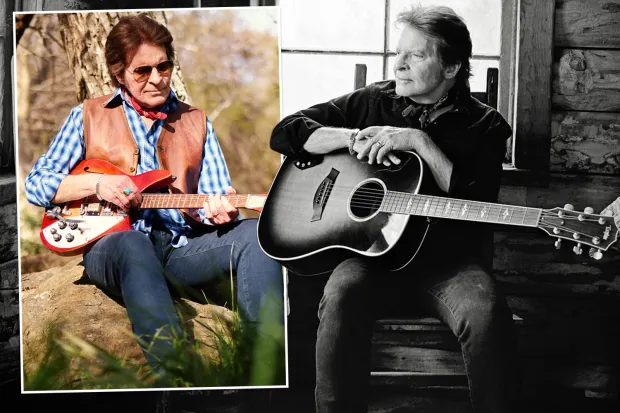
“Deja Vu (All Over Again)” is John Fogerty sounding the alarm with a weary heart—when history repeats, the heaviest cost is always paid in ordinary lives.
The moment you hear “Deja Vu (All Over Again)”, you can tell it wasn’t written to decorate the air. It was written to interrupt it—like a radio bulletin that forces you to pull the car over, because the words are suddenly heavier than the day you were having. Released in 2004 as the lead single and opening track from Fogerty’s album Deja Vu All Over Again, the song marked a jolt of urgency from an artist whose voice had always carried the grit of conscience. And even in the era of fragmented radio, it found a clear lane: the track rose to No. 4 on Billboard’s Adult Alternative (Adult Alternative Airplay) chart—not a pop-chart takeover, but a meaningful sign that listeners still wanted songs that told the truth plainly.
Just as telling is what was happening around it. The album Deja Vu All Over Again was released on September 21, 2004, Fogerty’s first solo studio album in seven years. It debuted at No. 23 on the Billboard 200—a respectable opening in the 2000s rock landscape, and a reminder that Fogerty’s name still meant something when paired with new, serious work. The record also carried the stamp of Fogerty’s own hands: he wrote and produced it, and he populated the title track with musicians who could deliver muscle without losing nuance—Benmont Tench on organ, Kenny Aronoff on drums, and even Mark Knopfler contributing a second lead guitar part, like a quiet nod between craftsmen.
But facts, however important, are only the bones. The soul of this song is its reason for existing.
Fogerty has been unusually candid about the spark: he began writing it as the United States moved toward the Iraq War, feeling the chill of an old nightmare returning. In an extended interview, he described writing lines almost as if they were “coming out of the sky,” only realizing what he was truly describing when the phrase “It’s déjà vu all over again” appeared—his sudden recognition that the needless deaths he’d witnessed emotionally during the Vietnam era seemed poised to repeat. That’s the song’s ache: it isn’t a slogan. It’s the sound of someone older, experienced, and tired—someone who has watched the movie before and knows exactly which scenes will break your heart.
Because “Deja Vu (All Over Again)” does something subtle that many “protest songs” don’t: it refuses the cheap comfort of certainty. It doesn’t posture as a speech from a podium. Instead it focuses on the human atmosphere—families bracing for bad news, young lives poured into uniforms, the awful predictability of promises made from far away. Even the way Fogerty framed it publicly is revealing: he emphasized the sadness of loss more than partisan point-scoring, the sense that grief is what history repeats most reliably.
And then there’s the performance history, which gives the song an almost cinematic poignancy. According to documented live notes, Fogerty first played it publicly at a John Kerry–John Edwards fundraising event at Radio City Music Hall on July 8, 2004—a debut that made its context unmistakable, even as the song itself remains emotionally broader than any one election season. In other words: he didn’t “sneak” this one out. He introduced it into the world the way you introduce a difficult truth—directly, in front of people, while the moment is still burning.
Musically, the genius is that it feels familiar without feeling recycled. The groove carries Fogerty’s signature American pulse—roots rock with that swampy undercurrent—yet the mood is darker, more reflective. It’s as if the bright engines of Creedence have been replaced with a late-night dashboard glow: still moving forward, but with a long memory riding shotgun. That’s why the title lands so hard. “Deja vu” isn’t just repetition—it’s repetition with recognition, repetition with dread, repetition with the bitter knowledge that we could have learned, and didn’t.
So the meaning of “Deja Vu (All Over Again)” becomes painfully simple: history doesn’t repeat as an abstraction. It repeats as letters, phone calls, folded flags, hospital corridors, empty chairs. Fogerty sings it like a man who has known fame, lawsuits, comebacks, and applause—and still understands that none of that matters next to the cost of avoidable loss.
Some songs age into nostalgia. This one ages into warning. And that is precisely why it endures.